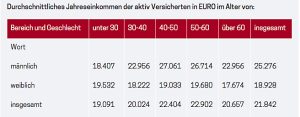The German book market with 9,131 million euro sales volume (2018), 74,000 new titles each year and 367 million copies* sold (20172) accounts for 7.8% of total sales in the cultural and creative industries in Germany. The number of sold copies has declined since 2007 from 404 million to today 367 million (-15 %), the percentage of sold e-books and audiobooks had increased slightly.
Overall, the German Book market lost 6 million customers since 2012. Significant losses are in the target group of 20-39 year old1, who stopped reading as well buying books.
29.6 million people in Germany are still frequently book-buyers, the average price of the books is 11 euros**, most of the buyers buy ten books a year, women more (16) then men (4). 30 percent2 of buyers are used to read daily or every third day, women more (40 %) then men (24 %). This percentage of daily readers is lowering constantly since 2014; 2014 Netflix was launched, what might be one of the reasons.
More and more people are online, and much of the online time is used for communication, but movies and online games are also highly relevant. The »attention economy« for books is cut down, while the usage of streaming movies and serials on demand has increased; in the group of 20-39-year-old up to nearly daily use of Binge-Watching – plus being online for 4.5 hours each day3.
Numbers of Authors at the CMO VG WORT
The number of authors and publishing houses registered at the German collecting society and CMO »VG Wort« rose by 2.6% in 2018. The complete index of all authors and publishers who had ever published a piece of text-work (a blog, a report, a book, a screenplay, audioplay, science-article, a translation …) comprises a total of 788,101 names. Among them authors make up about 90 percent of all of these registered names. These could be full, part- or single-time writers as well as only one-time-publications, and also blogs, translations or interviews.
In 2018 246,080 authors4 (fiction and nonfiction-writers, journalists, science book authors, screenplay writers, poets, blogger, self-publisher, translators …) had been entitled to be remunerated by the CMO for their published, copied and lent text-works. However, this does not make a living or a fulltime-writer:
Word-workers in Germany: 41,255 – ca. 9,000 fulltime writers among them
In order to be insured with the KSK and to be entitled to subsidies from pension-, health- and social-insurance, a minimum annual income of 3,900 euros from freelance full-time »word work« is required. About 9,000 freelance and fulltime book writers (fiction, non-fiction, academic) are insured at the KSK.
The data of annual income at the KSK is based on self-assessments for the following year. Currently, 41,255 fulltime-»word-worker« – fiction, non-fictionwriter, screenplays, poets, translators, journalists, lectors, coaches – in Germany reached the minimum of 3,900 Euro and are insured with the KSK5.
Word-workers’ income average (21,842 Euros/year) itemized by gender and age
There is also a gender-gap in authors’ average income of 25 % less income for female word-workers in total. Women word-workers over 60 earn the least and male writers over 50 the most. Womens word-workers over 60 years reach also a significant lower pension as male writers.

1 * excluding school and learning books, including audiobooks and e-books ** the pricing of the book market in Germany is subject to the fixed book price system 2 www.boersenverein.de/Study_Book_Buyer_Quo_Vadis_key_results_english.pdf, GfK Consumer Panel Media*Scope book 3 Publikumsbuchmarkt (ohne Schul– und Fachbücher, ohne Streaming) aus dem GfK Consumer Panel Media*Scope Buch 4 Allensbacher Markt- und Werbeträgeranalyse, IfD Allensbach 5 ARD/ZDF-Onlinestudie 2017 6 www.vgwort.de/Geschaeftsbericht_2018.pdf 7 www.kuenstlersozialkasse.de/service/ksk-in-zahlen.html

